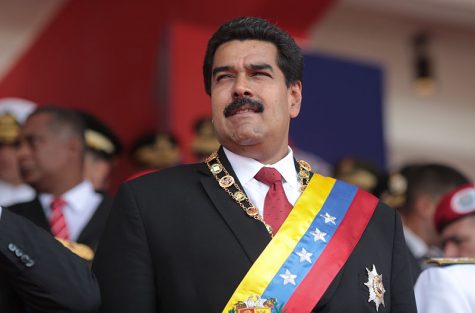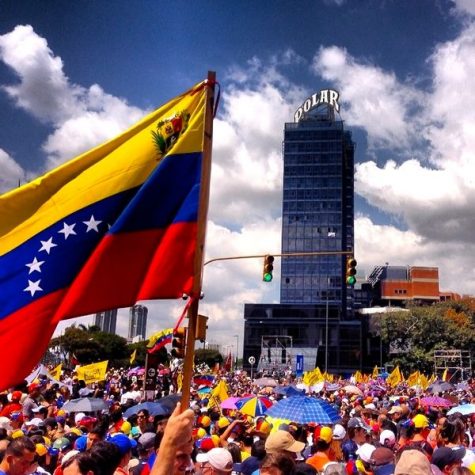The Crisis in Venezuela: A Country in Collapse

Courtesy of Hugoshi. Nicolas Maduro, president of Venezuela, standing among officers.
Venezuela’s economy has been steadily falling for the past few years, but it has been especially poor this past year. With all the malnutrition, crime, inflation, toxicity, and disease in Venezuela, it is no wonder why their economy is doing so poorly. Along with that, Venezuela’s top industry, the oil industry, has also been declining. Although it is one of the most rich countries natural resource-wise, it has one of the worst economies in the world. Their oil reserves are richer than Saudi Arabia’s, which logically should leave their economic state better than the state is in right now, but in fact they are struggling more.
Dozens of people were killed on October 27th, due to an anti-government protest in Caracas, Venezuela. They were protesting against President Nicolas Maduro and other officials to halt referendum procedures and trying to remove Maduro as president. Anti-government protesters are not stepping down but neither is the government, resulting in more deaths.
In addition, oil rich Venezuela has been struggling for years, but its economic situation has never been as detrimental as this past year. The prices of oil have fallen 60 percent since 2014 as they struggle to pay back debts. Since oil is not worth as much as it used to be, and it is an essential part of Venezuela’s economy, Venezuela has been hit by major inflation. This economic depression was mostly provoked by the oil crash in 2012. Furthermore, Venezuela’s government sells everything at prices lower than the production cost, which also leads to monetary problems. In fact, according to the Washington Post, oil is cheaper than water in Venezuela, which contributes to the poor health and economy.
Along with oil, another economic problem is that the inflation rates have skyrocketed, to the point where it may reach 1500 percent in 2017 according to CNBC. It is estimated to reach 700 percent by the end of this year, which is the highest in the world. The inflation is so severe to the point that Venezuela’s currency, the bolivar, is worth less than a penny. The center of where their money is developed is Santa Elena de Uairen, which is near the border of Venezuela and Brazil. Because Santa Elena is on the outskirts of Venezuela, it is too far and unreliable to use credit cards so people resort to cash. The inflation has made it impossible for Venezuela to pay off debts because they cannot make any money. Therefore, they cannot pay for anything. To add insult to injury, their oil mines are also decreasing so they cannot make more money.

The decrease in oil pales in comparison to the lack of food imports in Venezuela. According to CNN, “Bread shipments to Venezuela fell 94 percent in the first half of 2016 compared to the same period last year. That is $216,000 worth of bread this year, versus $3.5 million last year.” Malnutrition is one of the biggest problems and is a leading cause of death in Venezuela. Rarely anyone can afford actual meals and there are not enough imports of food. Although they are surrounded by countries with lots of resources like Brazil, they do not receive much help. According to CNN, they are exchanging oil for food and medicine with Jamaica as a feeble attempt to receive more food, but within the last year, bread shipments have gone down 94 percent and fruit shipments have gone down 99 percent.
There is also a great shortage of medicine in Venezuela. They can barely afford food, much less medicine, and hospitals are unsanitary with little electricity. The air is also extremely toxic, but people do what they can do for money, such as mining in dangerous and unhealthy conditions. 70,000 people turn to the gold mines to earn money, but with the mines comes a big price: malaria. Malaria is back in Venezuela and with scarcely any medicine, there is no way of escaping it. In 1961, they were the first to stop malaria, but now it seems that everything is going backwards for Venezuela. Venezuela’s malaria problem is going to spread to neighboring countries, and there is nothing to be done in Venezuela to prevent this from happening.
Crime is also huge issue in Venezuela, with a high homicide rate and rampant express kidnapping, which is kidnapping a person and emptying their bank account. The government’s lack of help sparked many anti-government protests in Venezuela, and people are protesting for a better overall economy.





